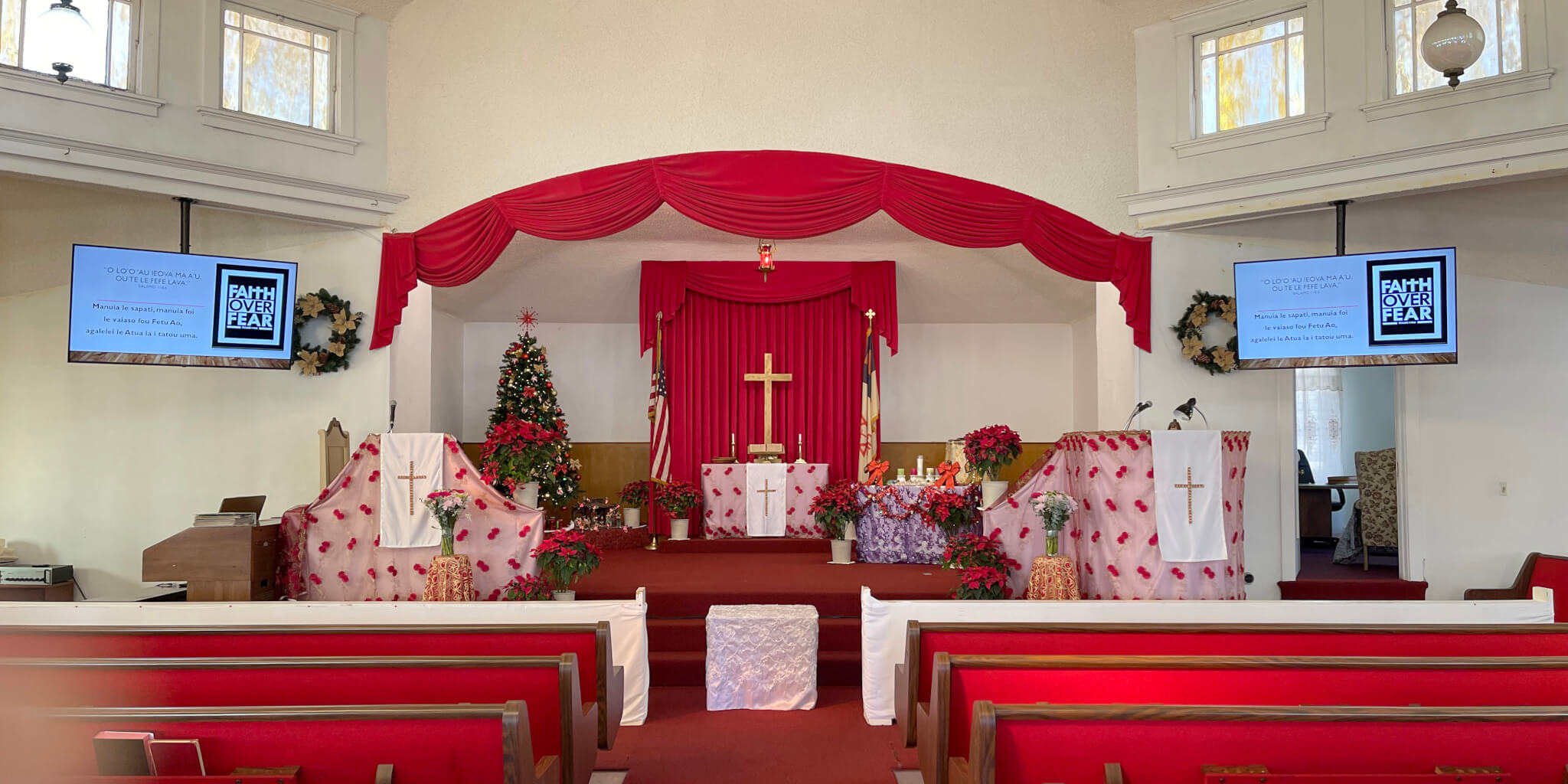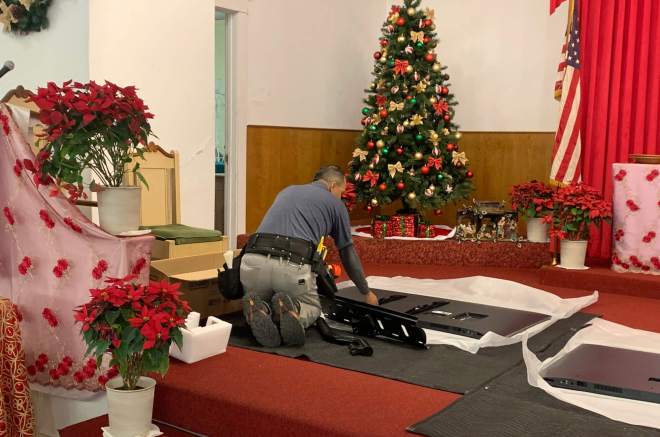Tech for all – Pacific Islander grants help congregations stay connected

The sanctuary of Fetu Ao Samoan UMC in Torrance, California, outfitted with new screens made possible by a Pacific Islander grant from Global Ministries. PHOTO: COURTESY OF FETU AO UMC
Grants from the United Methodist Pacific Islander Ministry Plan in 2021 and 2022 helped Tongan, Samoan and Fijian congregations in the U.S. develop tools for online ministry and outreach, particularly to keep senior members engaged during COVID-19 lockdowns.
By Christie R. House
May 27, 2022 | ATLANTA
While all congregations in the United States have felt some degree of disruption and frustration from the COVID-19 pandemic, congregations that draw both spiritual and cultural strength from their church communities have had particularly difficult challenges trying to keep everyone safe and connected. During government and denominational requested lock-downs, some churches were able to embrace the switch to online worship, creating small worship teams, conducting worship, and streaming or recording services for congregations to watch and participate in online. Other congregations had never even imagined a need for this kind of worship and had neither the means nor the know-how to pull it off.
United Methodist Pacific Islander congregations in the United States draw a lot of strength from their faith communities. They have unique rituals, holidays and spiritual practices in addition to those practiced by a majority of United Methodists. Along with spiritual nurture, their churches form a hub of community life, strengthening their cultural identities and their ties to their countries of origin.
When the coronavirus pandemic prevented Pacific Islander churches from gathering, the hardship on the community was great. Fetu Ao United Methodist Church, a Samoan congregation in Torrance, California, had no wi-fi in the church, so streaming was not possible. While they were able to resume in-person services in 2021, many of their elder members feared returning, since COVID-19 variants continue to spread and cause spikes in cases.

Dr. Dana Lyles, director of Global Ministries Multiethnic Ministries, which includes the Pacific Islander Ministry Plan, could see that a little help in this case had the potential to go a long way in resourcing congregations to stay connected with all members, even those who decided they were not ready to return to inside group worship. Fetu Ao was one of 17 Pacific Islander congregation that received a grant to purchase new technological equipment and software to offer online worship. They contracted for wi-fi on the church grounds.
“This grant has allowed us to bring our worship into the 21st century and reach many more people,” said Rose Leilua, Fetu Ao’s treasurer. “It has been a real blessing.”
In addition to the technology gains, some churches also received Covid-19 safety resources, such as masks, sanitizers and cleaning supplies.
Pacific Islanders draw strength from one another
Most Pacific Islander congregations in the U.S. have a majority of Tongan, Samoan or Fijian members, though some churches have a multicultural combination of two or all three. Methodists worship in all three island nations. Pacific Islander immigrants to the U.S. have desired to plant new churches, though they do not always have the resources to do so without the help of established churches.
Pacific Islanders petitioned General Conference for a program whose main purpose is to strengthen existing congregations and plant new faith communities as well as develop a strong network in which congregations can resource one another. The 2012 General Conference passed the Comprehensive Plan for Pacific Islander Ministry in the U.S., developed over a four-year period by a committee of Pacific Islanders and staff members of Global Ministries, which today administers the work of the plan.
Though many of the grant recipient congregations chose to outfit their churches with lap tops, screens, camcorders and tri-pods to produce better online worship, one particular church decided to outfit the congregation instead.
Medford Samoan Mission in Medford, Oregon, decided to purchase Chromebooks to deliver to members of the congregation who had no computer equipment. Not only does this give them access to worship, it also gives children and youth in these households a way to follow schoolwork and connect with their teachers and friends. As a mission outreach, the Medford Samoan Mission request did double duty.
Another kind of “booster”
Acquiring the grant to purchase equipment can be half the battle, as the Fetu Ao congregation discovered.
“Our greatest challenge was finding someone or a company for the installation,” notes Leilua. “This was the first time we’d done anything like this, but we ‘googled’ our way through it.”
The challenge was worth it though, increasing the knowledge and capabilities of a few members as well, who now record or live stream services. The big screens they installed have allowed the congregation to incorporate more music, particularly music from Samoa. Their attendance and participation for in-person worship have increased.
Leilua concludes: “Our project seemed like a huge task, but with the Lord’s help and slowly navigating our way, we reached our goal and completed the project. It has incredibly boosted the morale of our congregation.”
Christie R. House is a consultant editor and writer with Global Ministries and UMCOR.

